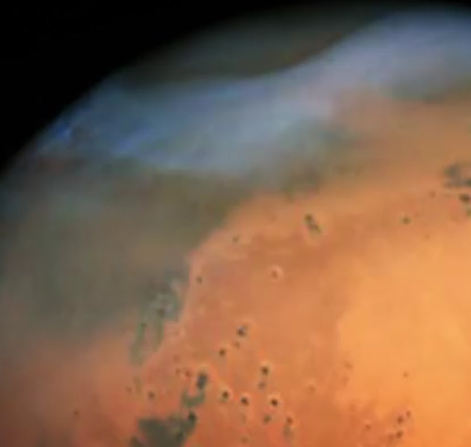(单词翻译:单击)
Mars is a well-mined subject here on SciShow Space,
火星在“太空科学秀”中是个脍炙人口的话题,
whether we're talking about the challenges of future human exploration there
不管是讨论人类未来探索面临的挑战,
or following the amazing things Curiosity is doing right now,
还是追踪“好奇”号正在做的奇妙事,
but here's one question we have yet to answer:
我们有一个问题始终未能解决:
how long could you just survive on the surface of Mars without a spacesuit?
如果没有太空服,你能在火星表面活多久?
The good news is that you'd last longer than you would on Venus,
好消息是,你比在金星上活得久,
which is probably the most inhospitable place on the surface of any planet.
因为金星表面可能是所有行星中最荒凉的地方。
The bad news is that you're still going to pass out in less than 30 seconds and be dead in a minute (maybe 90 seconds if you're lucky).
坏消息是,你会在30秒内昏倒,一分钟后死亡(如果幸运的话,能活90秒)。
Now, yes, Mars and Earth do have some very basic things in common.
火星和地球确实有些基本物质是相同的。
Like Earth, Mercury, and Venus, it's a rocky planet, so it actually has a surface that you can stand on, which is nice.
它和地球、水星和金星一样,都是岩质行星,所以有一个能站立的表面,这很好。
But, because it's just over half as big as Earth and much less dense, Mars has only 38% of Earth's gravity;
但是,因为它只有地球大小的一半,而且密度小得多,重力仅是地球的38%;
so as you're fumbling for your keys to get back in your spaceship, or whatever,
所以,当你在摸索钥匙回宇宙飞船或做别的事时,
your movements might be kind of jerky and sudden and weird,
你的动作可能有点儿不稳,显得突兀而怪异,
but that is definitely the least of your problems right now.
但这绝对是你目前最不需要解决的问题。
It's also very cold, for one thing, thanks both to its thin atmosphere and its greater distance from the sun.
它也很寒冷,一方面是因为它大气层稀薄,与太阳距离更远。
With not much atmosphere covering the planet's surface to retain heat,
由于没有太多的大气覆盖在其表面来保留热量,
the average temperature on Mars hovers around -60° Celsius,
火星的平均温度在-60°℃左右徘徊,
though the extremes range from -125 at the poles to a balmy 20 degrees at the equator.
不过它的极端温度在两极的-125℃和赤道温和的20℃之间波动。
20 degrees, that's perfectly livable. That's like Earth-like.
20℃很适宜居住,和地球很像。
And then there's the radiation problem.
然后就是辐射问题。
The atmosphere is way too thin to absorb ultraviolet light from the sun the way the Earth's does.
火星大气层太薄,无法像地球一样吸收太阳紫外线。
It also doesn't have a magnetic field the way that the Earth does,
它也没有地球那样的磁场,
so all that radiation is just hitting the ground pretty much in full strength.
所以所有辐射都是全力撞击地面。

And it won't kill you right away,
它不会立刻杀死你,
but should you survive your jaunt on the Martian surface,
但你一旦能在火星表面短期幸存下来,
problems will come up later as that radiation starts to cause mutations in your cells.
辐射开始在你的细胞中引起突变时,问题就会出现。
But your biggest problem is the atmosphere itself.
你最大的问题在于大气层本身。
The surface of Mars is not technically a vacuum,
理论上讲,火星表面并不是真空的,
but it's about as close as you can get without actually being in outer space.
但你的处境和在外太空时差不多。
What atmosphere there is on Mars is composed almost entirely of carbon dioxide with trace amounts of nitrogen, argon, and oxygen.
火星上的大气层几乎完全由二氧化碳组成,还含有微量的氮、氩和氧。
That's enough of an atmosphere to support some clouds and wind,
这样的大气层足以形成云和风了,
but the surface pressure on Mars is about 1 one hundredth that of what we have on Earth,
但是火星表面的压力大约只有地球的百分之一。
and the human body does not do well when suddenly exposed to extremely low atmospheric pressure.
人的身体突然暴露于这种极低的大气压时会出现不适。
Contrary to what you might have heard,
与你可能听到的消息相反,
exposure to vacuum-like conditions will not cause your blood to boil or your eyes to pop out of their sockets.
暴露在类似真空的环境中不会让你的血液沸腾,也不会让你的眼睛从眼窝里弹出来。
But with so little air pressure many of your bodily fluids will start to vaporize.
但是由于气压很小,你的许多体液将开始蒸发。
That means your sweat, mucus, saliva, and tears are going to evaporate within a few seconds, which is going to be uncomfortable.
这意味着你的汗水、黏液、唾液和眼泪会在几秒钟内蒸发掉,会很不舒服。
Also all that water in your body is about to turn into water vapor.
而且,你身体里所有的水分都将变成水蒸气。
Thanks to your strong and elastic skin, you're not going to explode,
多亏了你那结实而有弹性的皮肤,你不会爆炸,
but you will become bloated before you've had a chance to take in the view.
但在你有机会接受这个观点之前,会变得很臃肿。
The release of all the gasses in your blood and other fluids will basically give you a very quick and very severe form of the bends,
血液和其他体液中释放的所有气体会让你产生严重的减压病,它来势汹汹,
the decompression sickness that affects divers who return to the surface too fast.
这种病会快速影响回到水面的潜水员。
So, if you do become part of that generation of explorers that makes it to Mars,
所以,如果你真的成为探索火星一代的一员,
and I really hope that you do, for the love of Pete, don't forget to wear your spacesuit.
天哪,我真的希望你别忘了穿上太空服。
Thanks for joining me for SciShow Space.
感谢您收看本期的太空科学秀,
If you want to find out how you can help us keep exploring the universe, you can go to subbable.com/SciShow.
如果你想知道如何帮助我们继续制作此节目,就登录subbable.com/SciShow吧。
And also, if you want to keep getting smarter,
如果你想继续变聪明,
you can you to youtube.com/SciShowSpace and subscribe.
可以登录subbable.com/SciShow.点击订阅哦!


